Analysis of a Research Article on Diabetes Mellitus and Older Adults
VerifiedAdded on 2019/10/09
|6
|1405
|425
Report
AI Summary
This research article examines the potential overtreatment of diabetes mellitus in older adults, particularly those over 65. The study, conducted by Lipska et al., investigates the impact of tight glycemic control on this population, considering the presence of multiple comorbidities and functional limitations. The cross-sectional study analyzed data from 1288 diabetic adults, revealing that a significant portion, despite having poor health conditions, were still treated with insulin to achieve tight glycemic targets. The research highlights that intensive treatment may exceed the benefits for older patients, potentially leading to severe hypoglycemia and increased risks. The study emphasizes the importance of considering individual health complexities and the potential for overtreatment in managing diabetes in older adults, aligning with the consensus of the American Geriatrics Society. The study's findings underscore the need for personalized treatment approaches that balance the benefits of glycemic control with the potential harms, especially for older patients with multiple health issues.
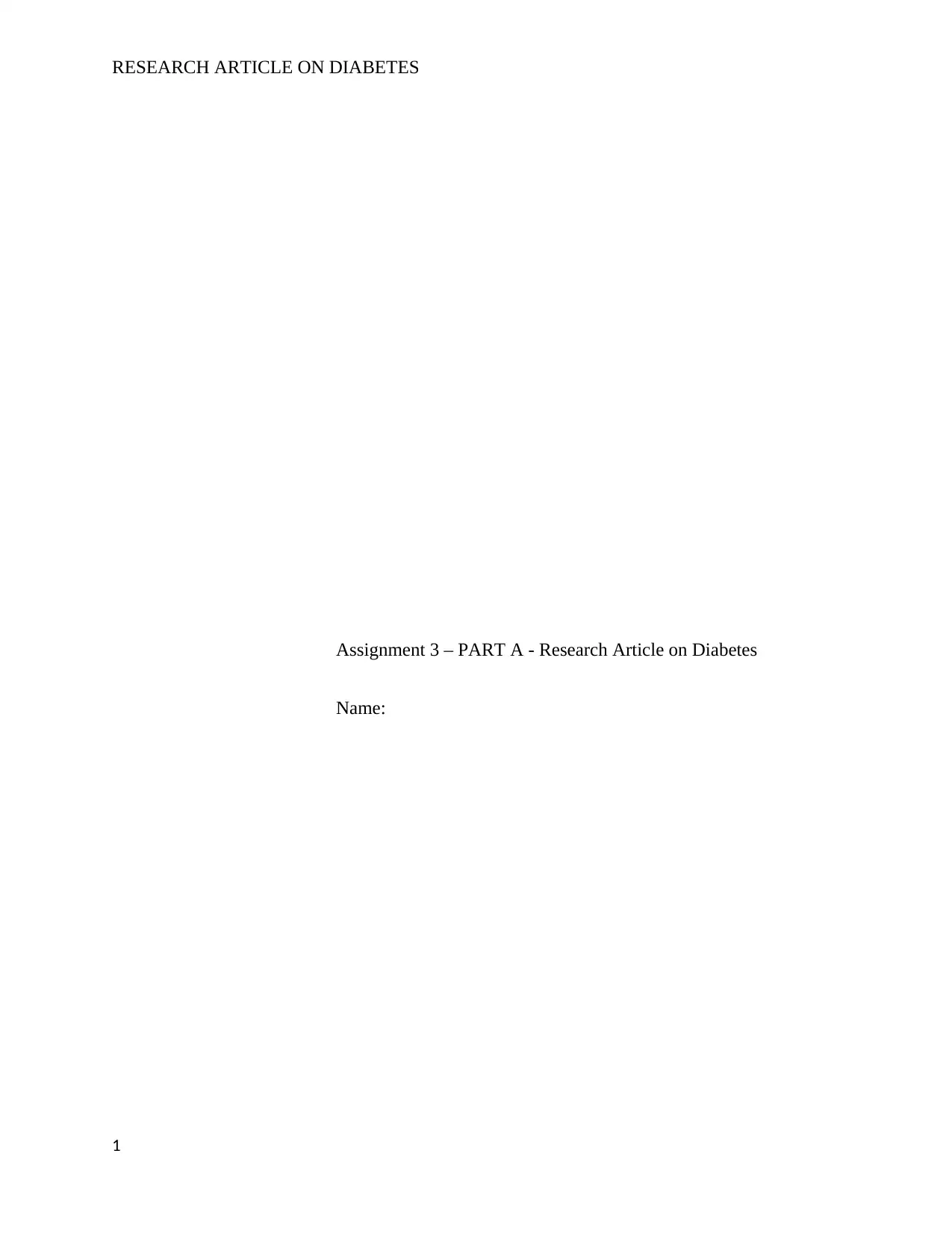
RESEARCH ARTICLE ON DIABETES
Assignment 3 – PART A - Research Article on Diabetes
Name:
1
Assignment 3 – PART A - Research Article on Diabetes
Name:
1
Paraphrase This Document
Need a fresh take? Get an instant paraphrase of this document with our AI Paraphraser
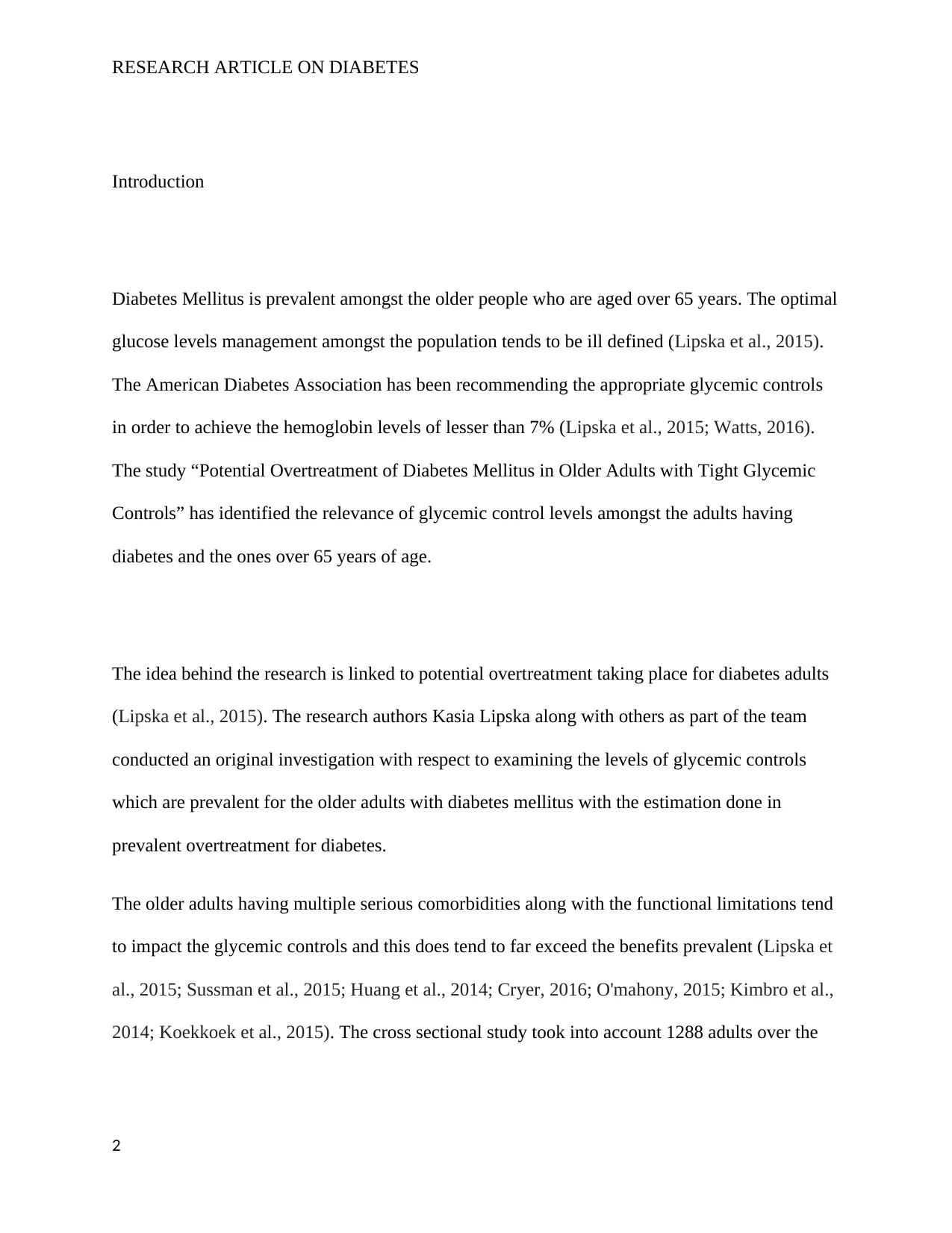
RESEARCH ARTICLE ON DIABETES
Introduction
Diabetes Mellitus is prevalent amongst the older people who are aged over 65 years. The optimal
glucose levels management amongst the population tends to be ill defined (Lipska et al., 2015).
The American Diabetes Association has been recommending the appropriate glycemic controls
in order to achieve the hemoglobin levels of lesser than 7% (Lipska et al., 2015; Watts, 2016).
The study “Potential Overtreatment of Diabetes Mellitus in Older Adults with Tight Glycemic
Controls” has identified the relevance of glycemic control levels amongst the adults having
diabetes and the ones over 65 years of age.
The idea behind the research is linked to potential overtreatment taking place for diabetes adults
(Lipska et al., 2015). The research authors Kasia Lipska along with others as part of the team
conducted an original investigation with respect to examining the levels of glycemic controls
which are prevalent for the older adults with diabetes mellitus with the estimation done in
prevalent overtreatment for diabetes.
The older adults having multiple serious comorbidities along with the functional limitations tend
to impact the glycemic controls and this does tend to far exceed the benefits prevalent (Lipska et
al., 2015; Sussman et al., 2015; Huang et al., 2014; Cryer, 2016; O'mahony, 2015; Kimbro et al.,
2014; Koekkoek et al., 2015). The cross sectional study took into account 1288 adults over the
2
Introduction
Diabetes Mellitus is prevalent amongst the older people who are aged over 65 years. The optimal
glucose levels management amongst the population tends to be ill defined (Lipska et al., 2015).
The American Diabetes Association has been recommending the appropriate glycemic controls
in order to achieve the hemoglobin levels of lesser than 7% (Lipska et al., 2015; Watts, 2016).
The study “Potential Overtreatment of Diabetes Mellitus in Older Adults with Tight Glycemic
Controls” has identified the relevance of glycemic control levels amongst the adults having
diabetes and the ones over 65 years of age.
The idea behind the research is linked to potential overtreatment taking place for diabetes adults
(Lipska et al., 2015). The research authors Kasia Lipska along with others as part of the team
conducted an original investigation with respect to examining the levels of glycemic controls
which are prevalent for the older adults with diabetes mellitus with the estimation done in
prevalent overtreatment for diabetes.
The older adults having multiple serious comorbidities along with the functional limitations tend
to impact the glycemic controls and this does tend to far exceed the benefits prevalent (Lipska et
al., 2015; Sussman et al., 2015; Huang et al., 2014; Cryer, 2016; O'mahony, 2015; Kimbro et al.,
2014; Koekkoek et al., 2015). The cross sectional study took into account 1288 adults over the
2
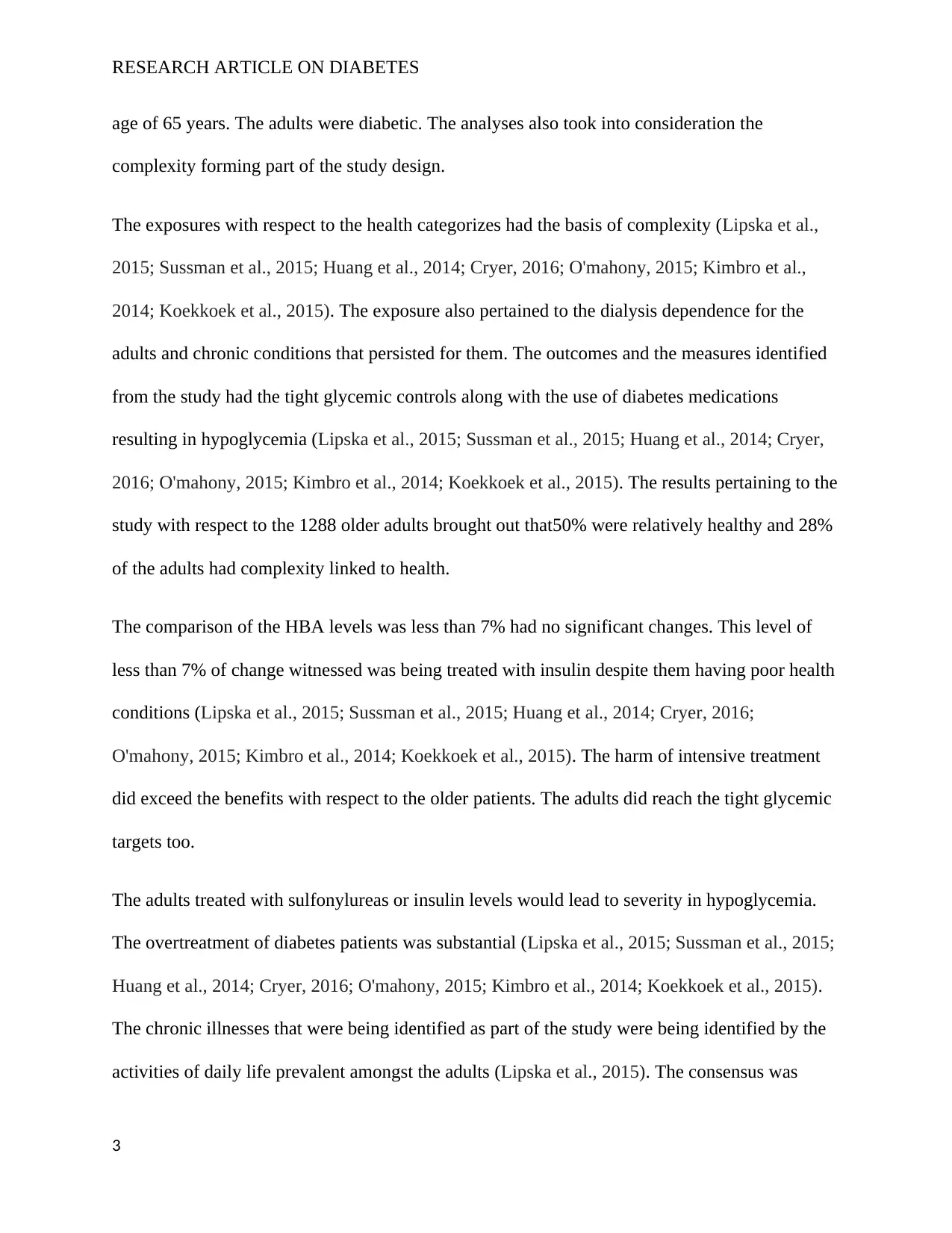
RESEARCH ARTICLE ON DIABETES
age of 65 years. The adults were diabetic. The analyses also took into consideration the
complexity forming part of the study design.
The exposures with respect to the health categorizes had the basis of complexity (Lipska et al.,
2015; Sussman et al., 2015; Huang et al., 2014; Cryer, 2016; O'mahony, 2015; Kimbro et al.,
2014; Koekkoek et al., 2015). The exposure also pertained to the dialysis dependence for the
adults and chronic conditions that persisted for them. The outcomes and the measures identified
from the study had the tight glycemic controls along with the use of diabetes medications
resulting in hypoglycemia (Lipska et al., 2015; Sussman et al., 2015; Huang et al., 2014; Cryer,
2016; O'mahony, 2015; Kimbro et al., 2014; Koekkoek et al., 2015). The results pertaining to the
study with respect to the 1288 older adults brought out that50% were relatively healthy and 28%
of the adults had complexity linked to health.
The comparison of the HBA levels was less than 7% had no significant changes. This level of
less than 7% of change witnessed was being treated with insulin despite them having poor health
conditions (Lipska et al., 2015; Sussman et al., 2015; Huang et al., 2014; Cryer, 2016;
O'mahony, 2015; Kimbro et al., 2014; Koekkoek et al., 2015). The harm of intensive treatment
did exceed the benefits with respect to the older patients. The adults did reach the tight glycemic
targets too.
The adults treated with sulfonylureas or insulin levels would lead to severity in hypoglycemia.
The overtreatment of diabetes patients was substantial (Lipska et al., 2015; Sussman et al., 2015;
Huang et al., 2014; Cryer, 2016; O'mahony, 2015; Kimbro et al., 2014; Koekkoek et al., 2015).
The chronic illnesses that were being identified as part of the study were being identified by the
activities of daily life prevalent amongst the adults (Lipska et al., 2015). The consensus was
3
age of 65 years. The adults were diabetic. The analyses also took into consideration the
complexity forming part of the study design.
The exposures with respect to the health categorizes had the basis of complexity (Lipska et al.,
2015; Sussman et al., 2015; Huang et al., 2014; Cryer, 2016; O'mahony, 2015; Kimbro et al.,
2014; Koekkoek et al., 2015). The exposure also pertained to the dialysis dependence for the
adults and chronic conditions that persisted for them. The outcomes and the measures identified
from the study had the tight glycemic controls along with the use of diabetes medications
resulting in hypoglycemia (Lipska et al., 2015; Sussman et al., 2015; Huang et al., 2014; Cryer,
2016; O'mahony, 2015; Kimbro et al., 2014; Koekkoek et al., 2015). The results pertaining to the
study with respect to the 1288 older adults brought out that50% were relatively healthy and 28%
of the adults had complexity linked to health.
The comparison of the HBA levels was less than 7% had no significant changes. This level of
less than 7% of change witnessed was being treated with insulin despite them having poor health
conditions (Lipska et al., 2015; Sussman et al., 2015; Huang et al., 2014; Cryer, 2016;
O'mahony, 2015; Kimbro et al., 2014; Koekkoek et al., 2015). The harm of intensive treatment
did exceed the benefits with respect to the older patients. The adults did reach the tight glycemic
targets too.
The adults treated with sulfonylureas or insulin levels would lead to severity in hypoglycemia.
The overtreatment of diabetes patients was substantial (Lipska et al., 2015; Sussman et al., 2015;
Huang et al., 2014; Cryer, 2016; O'mahony, 2015; Kimbro et al., 2014; Koekkoek et al., 2015).
The chronic illnesses that were being identified as part of the study were being identified by the
activities of daily life prevalent amongst the adults (Lipska et al., 2015). The consensus was
3
⊘ This is a preview!⊘
Do you want full access?
Subscribe today to unlock all pages.

Trusted by 1+ million students worldwide
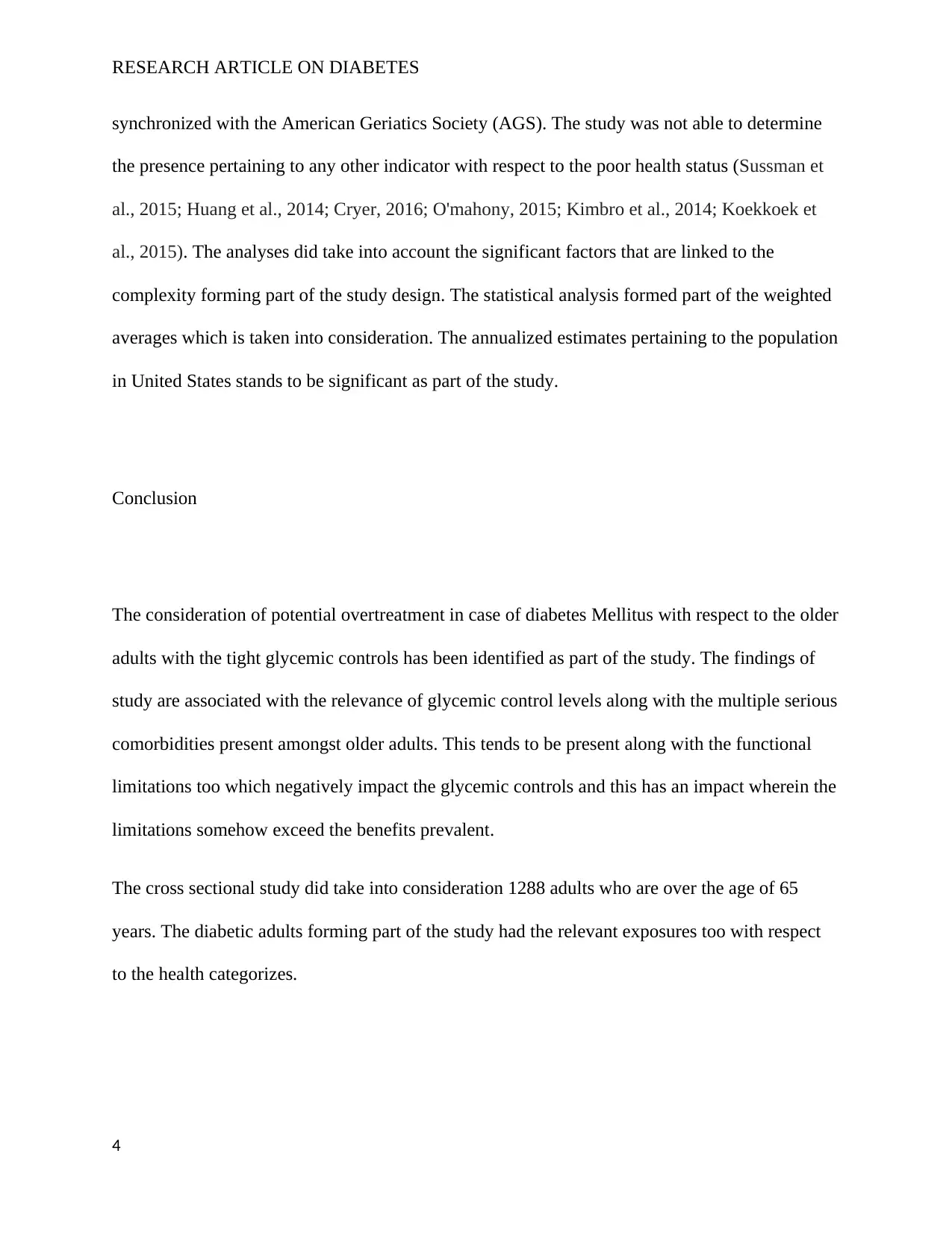
RESEARCH ARTICLE ON DIABETES
synchronized with the American Geriatics Society (AGS). The study was not able to determine
the presence pertaining to any other indicator with respect to the poor health status (Sussman et
al., 2015; Huang et al., 2014; Cryer, 2016; O'mahony, 2015; Kimbro et al., 2014; Koekkoek et
al., 2015). The analyses did take into account the significant factors that are linked to the
complexity forming part of the study design. The statistical analysis formed part of the weighted
averages which is taken into consideration. The annualized estimates pertaining to the population
in United States stands to be significant as part of the study.
Conclusion
The consideration of potential overtreatment in case of diabetes Mellitus with respect to the older
adults with the tight glycemic controls has been identified as part of the study. The findings of
study are associated with the relevance of glycemic control levels along with the multiple serious
comorbidities present amongst older adults. This tends to be present along with the functional
limitations too which negatively impact the glycemic controls and this has an impact wherein the
limitations somehow exceed the benefits prevalent.
The cross sectional study did take into consideration 1288 adults who are over the age of 65
years. The diabetic adults forming part of the study had the relevant exposures too with respect
to the health categorizes.
4
synchronized with the American Geriatics Society (AGS). The study was not able to determine
the presence pertaining to any other indicator with respect to the poor health status (Sussman et
al., 2015; Huang et al., 2014; Cryer, 2016; O'mahony, 2015; Kimbro et al., 2014; Koekkoek et
al., 2015). The analyses did take into account the significant factors that are linked to the
complexity forming part of the study design. The statistical analysis formed part of the weighted
averages which is taken into consideration. The annualized estimates pertaining to the population
in United States stands to be significant as part of the study.
Conclusion
The consideration of potential overtreatment in case of diabetes Mellitus with respect to the older
adults with the tight glycemic controls has been identified as part of the study. The findings of
study are associated with the relevance of glycemic control levels along with the multiple serious
comorbidities present amongst older adults. This tends to be present along with the functional
limitations too which negatively impact the glycemic controls and this has an impact wherein the
limitations somehow exceed the benefits prevalent.
The cross sectional study did take into consideration 1288 adults who are over the age of 65
years. The diabetic adults forming part of the study had the relevant exposures too with respect
to the health categorizes.
4
Paraphrase This Document
Need a fresh take? Get an instant paraphrase of this document with our AI Paraphraser
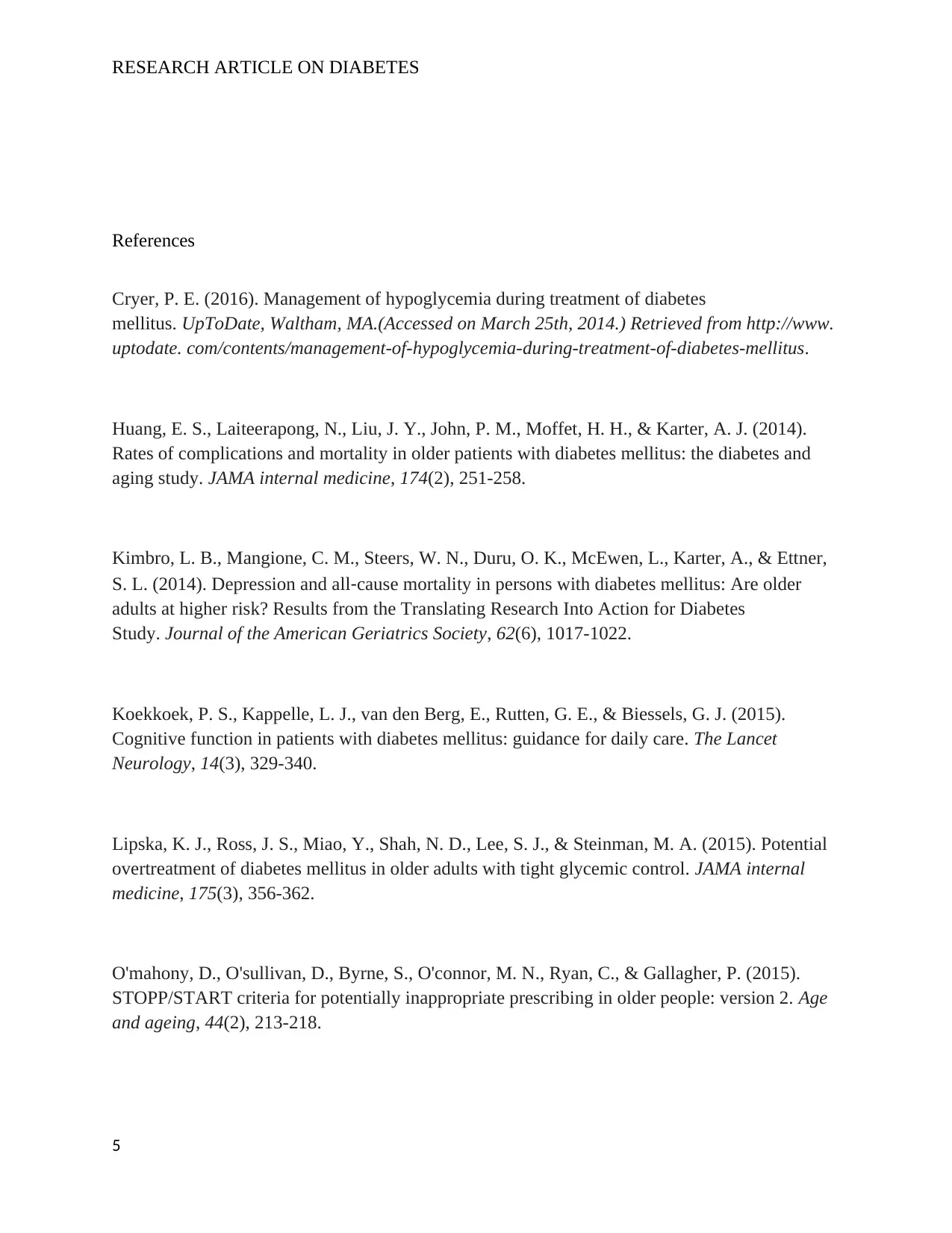
RESEARCH ARTICLE ON DIABETES
References
Cryer, P. E. (2016). Management of hypoglycemia during treatment of diabetes
mellitus. UpToDate, Waltham, MA.(Accessed on March 25th, 2014.) Retrieved from http://www.
uptodate. com/contents/management-of-hypoglycemia-during-treatment-of-diabetes-mellitus.
Huang, E. S., Laiteerapong, N., Liu, J. Y., John, P. M., Moffet, H. H., & Karter, A. J. (2014).
Rates of complications and mortality in older patients with diabetes mellitus: the diabetes and
aging study. JAMA internal medicine, 174(2), 251-258.
Kimbro, L. B., Mangione, C. M., Steers, W. N., Duru, O. K., McEwen, L., Karter, A., & Ettner,
S. L. (2014). Depression and all‐cause mortality in persons with diabetes mellitus: Are older
adults at higher risk? Results from the Translating Research Into Action for Diabetes
Study. Journal of the American Geriatrics Society, 62(6), 1017-1022.
Koekkoek, P. S., Kappelle, L. J., van den Berg, E., Rutten, G. E., & Biessels, G. J. (2015).
Cognitive function in patients with diabetes mellitus: guidance for daily care. The Lancet
Neurology, 14(3), 329-340.
Lipska, K. J., Ross, J. S., Miao, Y., Shah, N. D., Lee, S. J., & Steinman, M. A. (2015). Potential
overtreatment of diabetes mellitus in older adults with tight glycemic control. JAMA internal
medicine, 175(3), 356-362.
O'mahony, D., O'sullivan, D., Byrne, S., O'connor, M. N., Ryan, C., & Gallagher, P. (2015).
STOPP/START criteria for potentially inappropriate prescribing in older people: version 2. Age
and ageing, 44(2), 213-218.
5
References
Cryer, P. E. (2016). Management of hypoglycemia during treatment of diabetes
mellitus. UpToDate, Waltham, MA.(Accessed on March 25th, 2014.) Retrieved from http://www.
uptodate. com/contents/management-of-hypoglycemia-during-treatment-of-diabetes-mellitus.
Huang, E. S., Laiteerapong, N., Liu, J. Y., John, P. M., Moffet, H. H., & Karter, A. J. (2014).
Rates of complications and mortality in older patients with diabetes mellitus: the diabetes and
aging study. JAMA internal medicine, 174(2), 251-258.
Kimbro, L. B., Mangione, C. M., Steers, W. N., Duru, O. K., McEwen, L., Karter, A., & Ettner,
S. L. (2014). Depression and all‐cause mortality in persons with diabetes mellitus: Are older
adults at higher risk? Results from the Translating Research Into Action for Diabetes
Study. Journal of the American Geriatrics Society, 62(6), 1017-1022.
Koekkoek, P. S., Kappelle, L. J., van den Berg, E., Rutten, G. E., & Biessels, G. J. (2015).
Cognitive function in patients with diabetes mellitus: guidance for daily care. The Lancet
Neurology, 14(3), 329-340.
Lipska, K. J., Ross, J. S., Miao, Y., Shah, N. D., Lee, S. J., & Steinman, M. A. (2015). Potential
overtreatment of diabetes mellitus in older adults with tight glycemic control. JAMA internal
medicine, 175(3), 356-362.
O'mahony, D., O'sullivan, D., Byrne, S., O'connor, M. N., Ryan, C., & Gallagher, P. (2015).
STOPP/START criteria for potentially inappropriate prescribing in older people: version 2. Age
and ageing, 44(2), 213-218.
5
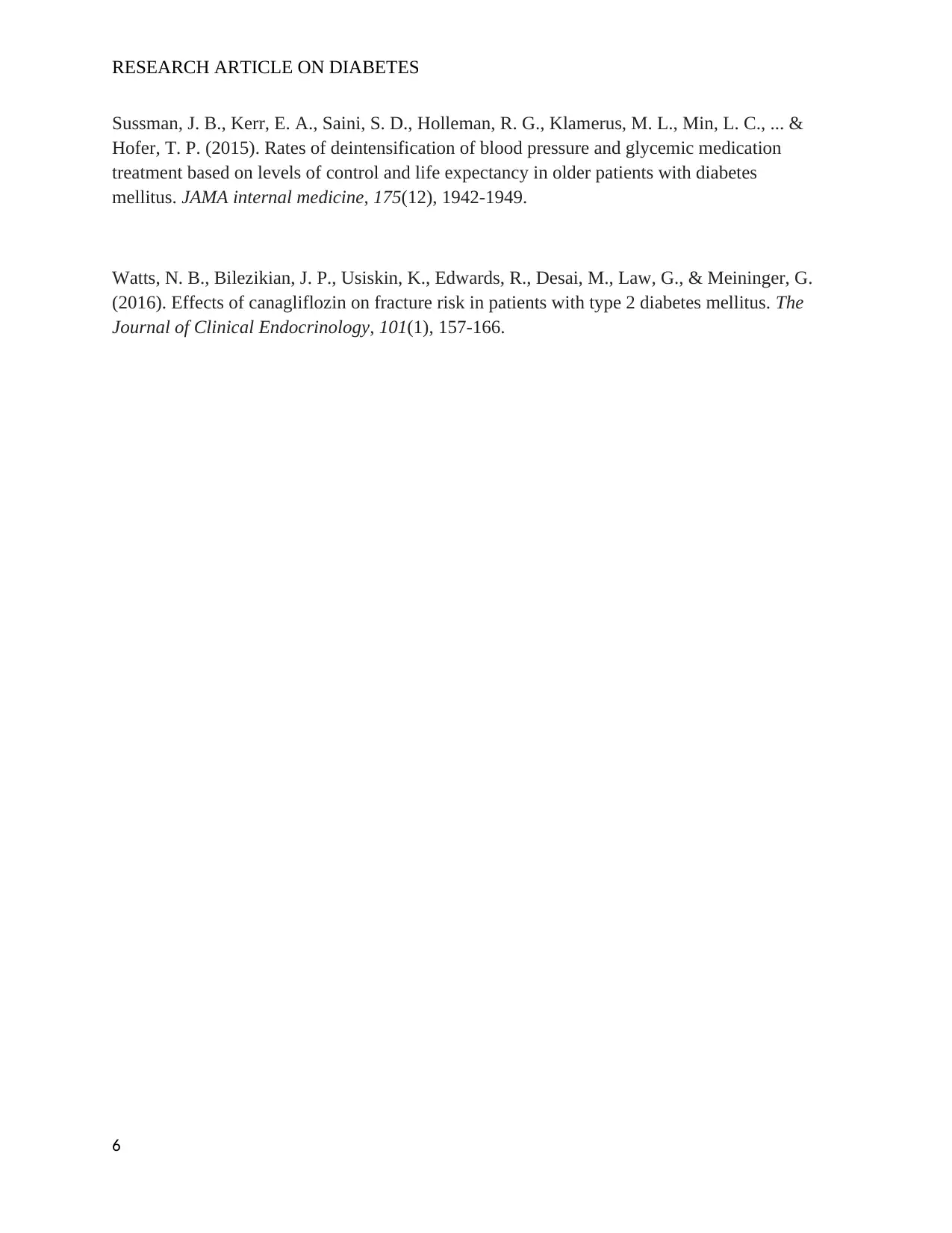
RESEARCH ARTICLE ON DIABETES
Sussman, J. B., Kerr, E. A., Saini, S. D., Holleman, R. G., Klamerus, M. L., Min, L. C., ... &
Hofer, T. P. (2015). Rates of deintensification of blood pressure and glycemic medication
treatment based on levels of control and life expectancy in older patients with diabetes
mellitus. JAMA internal medicine, 175(12), 1942-1949.
Watts, N. B., Bilezikian, J. P., Usiskin, K., Edwards, R., Desai, M., Law, G., & Meininger, G.
(2016). Effects of canagliflozin on fracture risk in patients with type 2 diabetes mellitus. The
Journal of Clinical Endocrinology, 101(1), 157-166.
6
Sussman, J. B., Kerr, E. A., Saini, S. D., Holleman, R. G., Klamerus, M. L., Min, L. C., ... &
Hofer, T. P. (2015). Rates of deintensification of blood pressure and glycemic medication
treatment based on levels of control and life expectancy in older patients with diabetes
mellitus. JAMA internal medicine, 175(12), 1942-1949.
Watts, N. B., Bilezikian, J. P., Usiskin, K., Edwards, R., Desai, M., Law, G., & Meininger, G.
(2016). Effects of canagliflozin on fracture risk in patients with type 2 diabetes mellitus. The
Journal of Clinical Endocrinology, 101(1), 157-166.
6
⊘ This is a preview!⊘
Do you want full access?
Subscribe today to unlock all pages.

Trusted by 1+ million students worldwide
1 out of 6
Related Documents
Your All-in-One AI-Powered Toolkit for Academic Success.
+13062052269
info@desklib.com
Available 24*7 on WhatsApp / Email
![[object Object]](/_next/static/media/star-bottom.7253800d.svg)
Unlock your academic potential
Copyright © 2020–2026 A2Z Services. All Rights Reserved. Developed and managed by ZUCOL.





